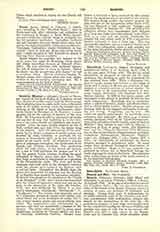

Beuno, Saint, Abbot of Clynnog, d. 660(?), was, according to the “Bucched Beuno”, born in Powisland and, after education and ordination in the monastery of Bangor, in North Wales, became an active missioner, Cadvan, King of Gwynedd, being his generous benefactor. Cadwallon, Cadvan’s son and successor, deceived Beuno about some land, and on the saint demanding justice proved obdurate. Thereupon, Cadwallon’s cousin Gweddeint, in reparation, “gave to God and Beuno forever his town-ship”, where the saint (c. 616) founded the Abbey of Clynnog Fawr (Carnarvonshire).
Beuno became the guardian and restorer to life of his niece, the virgin St. Winefride, whose clients still obtain marvellous favors at Holywell (Flint-shire). He was relentless with hardened sinners, but full of compassion to those in distress. Before his death “on the seventh day after Easter” he had a wondrous vision. Eleven churches bearing St. Beuno’s name, with various relics and local usages, witness to his far-reaching missionary zeal. He is commemorated on the 21st of April.
PATRICK RYAN

